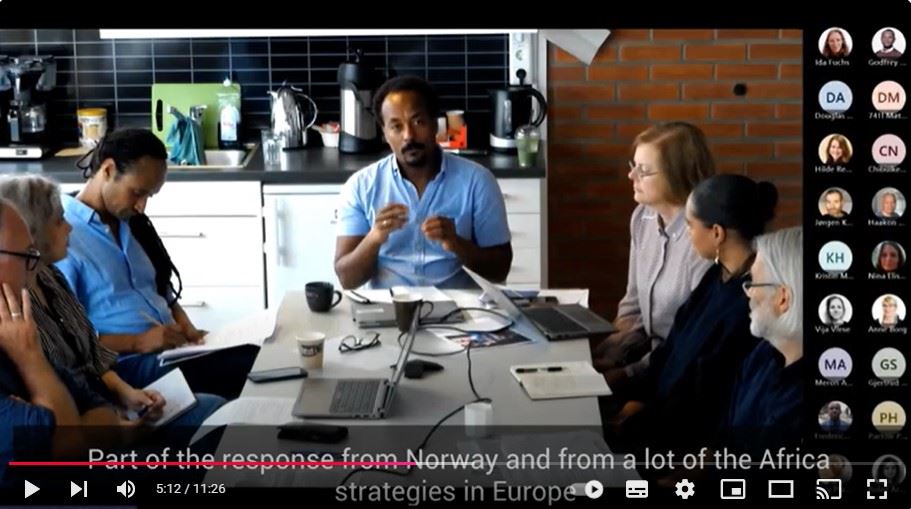
Global Impact - Gemini Center
Global Impact Policy Dialogues – Norway’s new strategy for African engagement

As part of its new Global Impact Policy Dialogues series, the Gemini center Equitable Partnerships for Global Impact (Global Impact in short), recently discussed Norway's newly released strategy for engaging with African countries. In a world where global power dynamics are shifting rapidly, and African nations are gaining increased influence, research and education are set to play an important role in partnership building with the continent. The panel consisting of Teklehaymanot G. Weldemichel (NTNU), Tatek Abebe (NTNU), Ingeborg Graabak (SINTEF), Håkon Bolkan (NTNU), Julia Amena Haugen (Pan African Student Union), and Petter Støa (SINTEF), with facilitator Rolee Aranya (NTNU) discussed the following:
Norway is enhancing its partnerships across Africa and has recently launched its new strategy for Norwegian engagement with African countries. African countries are increasingly recognized as key players in the new geopolitical order, leveraging their growing economic influence, youthful population, and strategic partnerships to shape global agendas and assert their interests on the world stage. In the seminar we explore: How does Norway's strategy align with these geopolitical changes, and does it signal a new approach? Which areas do the strategy emphasize, and which are less visible? What role can research, education, and innovation play in strengthening Norwegian-African collaborations?
See here for a short summary film of the discussion.
The Role of Research in Norway’s New Strategy
Teklehaymanot G. Weldemichel, in his analysis of the strategy (see recording of his full presentation here ) showed how research, innovation, and education were highlighted as priorities for Norway’s work with African countries. Through collaborations, these areas can potentially contribute to the strengthening of African societies but also ensure that Norway remains relevant in an increasingly globalized world. However, in his analysis Weldemichel emphasized that this calls for a fresh approach to Norway's foreign policy in Africa, requiring greater transparency about the interests being promoted through various collaborations than what is currently visible in the document.
Transformative Research for Mutual Benefit
As Tatek Abebe from NTNU's Department of Education and Lifelong Learning pointed out during the seminar, there is a need to move away from a model where African nations are seen merely as sites for data collection or testing grounds for Norwegian research and innovation projects. Abebe referred to The Africa Charter for Transformative Research Collaborations, which addresses imbalances in research partnerships between the Global South and North. Historically, partners from the Global North have led the high value aspects of joint projects, such as analysis and theory development, while African partners have often been relegated to data collection or local interpretations. Non-academic stakeholders, along with their perspectives, are frequently marginalized, and capacity-building efforts are typically directed only towards African partners. Moreover, rewards such as authorship in publications are often unevenly distributed. True collaboration between Norway and African institutions must be based on equal partnerships where both parties are recognized as contributing equally—there is still much work to be done in this regard he emphasized.
Connecting Research, Innovation, and Education
Africa is home to one of the world’s fastest-growing youth populations, which offers enormous potential for innovation, particularly in digital solutions, technology, and entrepreneurship. As noted by Rolee Aranya, NTNU head of Gemini Global Impact, Norwegian research and innovation sectors have much to learn from African entrepreneurship, which often demonstrates a remarkable ability to adapt and create solutions with limited resources. Petter Støa, SINTEF head Global Impact, emphasized how this is especially relevant in the energy sector. African countries, with their vast potential for renewable energy, can play a key role in the global energy transition, while Norway can contribute with technological expertise and research on energy efficiency. A case in point is as highlighted by Ingeborg Graabak, SINTEF, the OpenMod4Africa project, funded by the EU, which involves collaboration between energy industry networks and universities in 25 African countries.
Through well-developed partnerships that consider the entire value chain, Norway and African nations can create innovations with global significance. Norwegian research environments also stand to benefit by gaining access to new perspectives and knowledge from African partners, which can enhance Norway’s competitiveness on the global innovation stage. This could result in significant mutual commercial value. However, as Håkon Bolkan from NTNU Global Health stressed, it is crucial to avoid focusing solely on profitable innovation ideas, especially in areas like healthcare.
Education as a Bridge Builder
Universities and higher education institutions are key bridge-builders that can lay the foundation for future research and innovation collaborations. Several Norwegian universities, including NTNU, have already established strong partnerships with African universities. According to Julia Amena Haugen from the Pan-African Student Union in Trondheim, these partnerships are not just about knowledge exchange but about building a shared future where African and Norwegian students, researchers, and academics learn from each other. Engaging the African diaspora in Norway is also crucial in this effort.
Much has been written about Norway’s new strategy for collaboration with African countries, but the main takeaway from the seminar was the necessity of building competence in forming equitable partnerships with African institutions, particularly in research, innovation, and education. As was discussed during the seminar this requires Norway to confront past mindsets and hierarchies that have shaped development cooperation. True partnerships are about sharing power and responsibility, as well as respecting local contexts and knowledge.
To get news from the Gemini center Equitable Partnerships for Global Impact, sign up here.